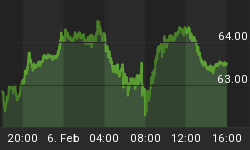It has become apparent to me that investors who continue to place money in the U.S. Treasury market don't have any idea how to protect themselves from inflation or how to achieve a real return on their investments. Even though inflation is running at a multi-decade high (according to official government numbers), we find that these fixed income investors were willing to send the yield on the 10 year note to an historical low of 3.38% on March 19th of this year. As amazing as that sounds in a world of 4+% "official" inflation rates, it was nothing compared to what happened just last month.
To illustrate how off base and directionless these investors can be, let me point to Ben Bernanke's rhetoric about the dollar and inflation in a speech on June 3rd and the bond market's reaction to it. On that day, the yield on the 10 year Treasury was 3.92%. Then, during a speech to an international banker's forum he made the following statements, "In collaboration with our colleagues at the Treasury, we continue to carefully monitor developments in the foreign exchange markets."
He continued, in reference to the long term picture for the dollar, "...the Federal Reserve's commitment to both price stability and maximum sustainable employment and the underlying strength of the U.S. economy--including flexible markets and robust innovation and productivity--will be key factors ensuring that the dollar remains a strong and stable currency."
Never mind the plethora of economic fallacies that exist in those two statements -- like the U.S. has actually had a strong and stable currency or how the Fed can even know, let alone provide for, maximum sustainable employment -- but the point here is what was the bond market's reaction to his comments: in just 10 days, the yield on the 10 year note shot up to 4.27%.
The reported reason? Finally, the Fed was being viewed as hawkish on inflation and would send the Fed Funds rate up in the near future in order to stop the dollar's decline.
So let me get this straight: the Fed was going to start fighting inflation and that is what sent rates higher? In reality, lower inflation rates should send bond yields lower! The only conclusion to reach is bond investors needed Ben Bernanke to remind them that a lower dollar is inflationary and that they should now start worrying about accepting such a low yield from their investments.
Later in June, of course, the Fed took a pass on backing its words with actions and left interest rates unchanged. The counter-intuitive reaction of the bond market in this instance? The yield on the 10 year dropped from 4.12% down to 3.91% as of July 1, 2008.
Unbelievably, the Fed's tacit statement that it is now powerless to fight inflation or protect the U.S. dollar was greeted by a flood of buying in the Treasury market! I understand that much of this move in Treasury yields is a flight to safety, but there have been much safer and more profitable places to hide. Yet one must think in terms of real returns to understand this, a notion apparently foreign to the bond market.
If fixed income investors desire to protect themselves from the ravages of inflation, they need to look no further than gold, which has increased 44% in the last 12 months alone. In light of the low nominal yield--and the negative real yield of 10-year Treasuries -- there is no comparison.
It is impossible to predict when fixed income investors will finally demand a positive return on their investments, but if we continue down this inflationary path the erosion of investors' buying power will force them to flee those paltry yields
For now, the fact remains that inflation is increasing while the yield on Treasuries is falling. It is a situation which mystifies me, yet I remain convinced it is an unsustainable condition; thus, it is of the utmost importance that investors position their portfolios to avoid the carnage that will likely ensue when the bond bubble finally bursts.
**Speaking of "keeping your money real," check out my podcast: The Mid-Week Reality Check!















